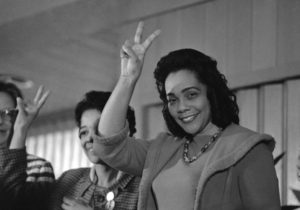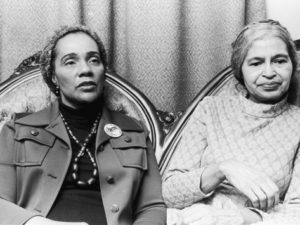Normally, around this time of year, we at S-USIH would post something about Martin Luther King, Jr. and American intellectual history. Considering that today is King’s actual birthday—we as a nation observe it tomorrow—I highly recommend reading works on King and intellectual history. Whether it is Richard King’s book on civil rights history and intellectual history, Civil Rights and the Idea of Freedom, or the still-underrated From Civil Rights to Human Rights by Thomas F. Jackson, and numerous works in between, King’s legacy within intellectual history is one that has been explored time and again by historians. Not to mention the fact that King’s legacy as shaped by American memory is also slowly being explored by historians, and King offers plenty for intellectual historians to explore.
Today, though, I would like to take a moment to talk about Coretta Scott King. Her own leadership in the Civil Rights Movement—both before and after MLK’s death—is worth its own monograph length work. After all, Coretta Scott was already an activist and thinker long before she met Martin Luther King, Jr.
Examining Coretta Scott King’s post-1968 career, for example, reminds us that many civil rights activists did not leave the political battlefield once the 1960s ended. On the contrary, leaders such as Coretta Scott King played an integral role in a variety of political and cultural fights in the 1970s, 1980s, and 1990s. For example, think  of the role Coretta Scott King played in the full employment fight of the 1970s—oft forgotten today, but a galvanizing campaign for many American progressives during the age of stagflation. David Stein’s article is the best treatment of the subject. To create an artificial line between the campaign for racial civil rights and economic rights in this, or any other era, would be to foster a separation of struggles that most activists involved in those debates simply did not see. (Her opposition to the Vietnam War, staying with the movement as a vocal reminder of not just her husband’s coming out against the war in 1967, but standing up for the vast majority of African Americans who turned against the conflict by the end of the 1960s, is another example of how the civil rights and left-wing movements of recent American history often coalesced around key issues.)
of the role Coretta Scott King played in the full employment fight of the 1970s—oft forgotten today, but a galvanizing campaign for many American progressives during the age of stagflation. David Stein’s article is the best treatment of the subject. To create an artificial line between the campaign for racial civil rights and economic rights in this, or any other era, would be to foster a separation of struggles that most activists involved in those debates simply did not see. (Her opposition to the Vietnam War, staying with the movement as a vocal reminder of not just her husband’s coming out against the war in 1967, but standing up for the vast majority of African Americans who turned against the conflict by the end of the 1960s, is another example of how the civil rights and left-wing movements of recent American history often coalesced around key issues.)
Two other areas where Coretta Scott King comes to the fore in American intellectual history are the anti-Apartheid movement and the campaign to make Martin Luther King Jr’s birthday a national holiday. Seeing her as a symbol of the still-powerful civil rights leadership that was involved in the 1970s and 1980s in fighting for sanctions against South Africa is important. Equally important is seeing King as part of a left counter to the Reagan presidency—something that was captured in the fight for MLK, Jr. Day. As intellectual historians, we need to consider Coretta Scott King’s centrality to both the post-1965 Civil Rights Movement and the broader American Left of this era.
This is in no way to take away from Coretta’s contribution to the women’s rights movement. Her presence at the 1977 National Women’s Conference in Houston, Texas was a highlight of an event designed to press forward national support for the Equal Rights Amendment.[1] Fast forward decades later, and Coretta Scott King’s outspoken support for LGBTQ rights—before much of the African American community followed suit—was an important moment in that movement’s fight for social and legal equality.
There are a few reasons for why intellectual historians have yet to treat Coretta Scott King as an important figure in recent American history. Most notably, the problem of getting access to her papers precludes any deep archival research. Further, who we consider to be worthy of treatment as a figure of intellectual history continues to be an issue. As Holly Genovese raised a few weeks ago—and as was admirably treated by several specialists in the realm of African American women’s history in a landmark collection—we need to be sensitive to changing definitions of who is “worthy” to be examined by historians as intellectuals. We can debate whether thinking of Coretta Scott  King as an “intellectual” is going a step too far. I would say no, because her thinking on how to shape the legacy of her late husband, not to mention her capable use of memory to fight for social and political issues dear to her, means that she could strategize and craft civil religion with the best of them.
King as an “intellectual” is going a step too far. I would say no, because her thinking on how to shape the legacy of her late husband, not to mention her capable use of memory to fight for social and political issues dear to her, means that she could strategize and craft civil religion with the best of them.
Coretta Scott King was important to intellectuals in the post-World War II era, as a symbol and as activist in her own right. Like Rosa Parks, Coretta Scott King’s legacy has been distorted by national myth. It will be up to historians to recover the radical, activist Coretta Scott King. One hopes that the release of Coretta Scott King’s memoir, as told to journalist Barbara Reynolds, My Life, My Love, My Legacy will stoke some new interest in Coretta’s legacy, activism, and thinking. Anything less would be a loss for history, and a disservice to the messy, vibrant, and complicated history of America after World War II.
[1] The timing of this event was not random—1977 was also the International Women’s Year as designated by the United Nations, and was the high point of the fight for the ERA. After this, support for the amendment would be driven down by conservative forces galvanized across the nation, most notably by Phyllis Schlafly. Marjorie Spruill’s book, Divided We Stand: The Battle Over Women’s Rights and Family Values That Polarized American Politics, due out at the end of February, will go into more detail about this momentous conference.

One Thought on this Post
S-USIH Comment Policy
We ask that those who participate in the discussions generated in the Comments section do so with the same decorum as they would in any other academic setting or context. Since the USIH bloggers write under our real names, we would prefer that our commenters also identify themselves by their real name. As our primary goal is to stimulate and engage in fruitful and productive discussion, ad hominem attacks (personal or professional), unnecessary insults, and/or mean-spiritedness have no place in the USIH Blog’s Comments section. Therefore, we reserve the right to remove any comments that contain any of the above and/or are not intended to further the discussion of the topic of the post. We welcome suggestions for corrections to any of our posts. As the official blog of the Society of US Intellectual History, we hope to foster a diverse community of scholars and readers who engage with one another in discussions of US intellectual history, broadly understood.
Thanks for this, Robert. I confess to not having given much thought to Coretta Scott King’s work and activism. This was enlightening. – TL